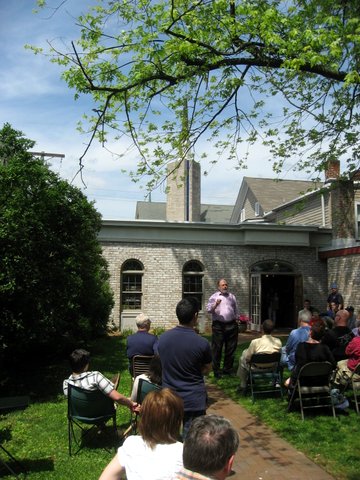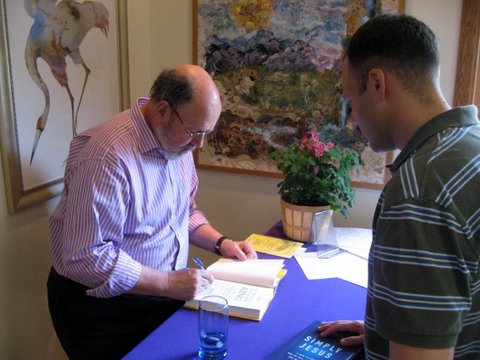I’ve said this over at facebook and to those who follow me at twitter, but it needs to be said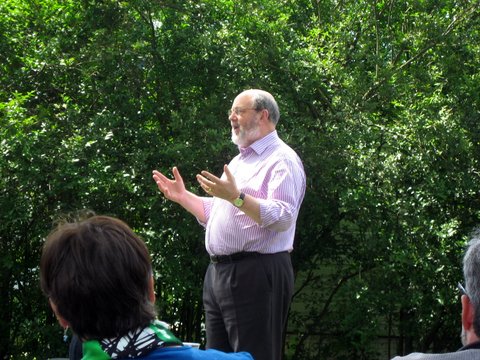
I had spent a quick lunchtime with Tom and Maggie, as I was warmly invited to call them, and we had chatted a bit the day before as we worked hard selling books at the lectures he was presenting at the wonderful Ecumenical Institute of Theology (at St. Mary’s Seminary in Baltimore.) We’ve served the EI before, selling books for Eugene Peterson and Miroslov Volf. As you can tell, they bring in some of the world’s best speakers and theological thinkers, which may indicate to you the quality of the advanced degrees they offer; we can vouch for the congeniality of the place, too. If you are anywhere in the greater Baltimore-Washington area, you should consider their course options. Their current dean Michael J. Gorman (who also teaches) is a friend of Tom Wright’s, and a friend of ours, so he is the man to thank for getting Tom to Hearts & Minds. We’ve sold books with N.T. before, but for him to show interest in coming here—wow! Thanks, Michael.
Gorman’s good books, by the way, include Cruciformity: Paul’s Narrative Spirituality of the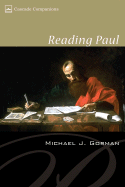 Cross (Eerdmans; $36.00), Apostle of the Crucified Lord: A Theological Introduction to Paul and His Letters (Eerdmans; $42.00) Inhabiting the Cruciform God: Kenosis, Justification, and Theosis in Paul’s Narrative Soteriology (Eerdmans; $24.00), Reading Paul (Cascade; $22.00), and Reading Revelation Responsibly: Uncivil Worship and Witness: Following the Lamb Into the New Creation (Wipf & Stock; $25.00.) The last two are quiet accessible—don’t you love the subtitle of the Revelation one?—while the first few are a bit more demanding. They are highly esteemed, especially drawing out the social and ethical implications of the Christ-centered sort of discipleship the Pauline letters demand and we are grateful to know the author as a friend and customer.
Cross (Eerdmans; $36.00), Apostle of the Crucified Lord: A Theological Introduction to Paul and His Letters (Eerdmans; $42.00) Inhabiting the Cruciform God: Kenosis, Justification, and Theosis in Paul’s Narrative Soteriology (Eerdmans; $24.00), Reading Paul (Cascade; $22.00), and Reading Revelation Responsibly: Uncivil Worship and Witness: Following the Lamb Into the New Creation (Wipf & Stock; $25.00.) The last two are quiet accessible—don’t you love the subtitle of the Revelation one?—while the first few are a bit more demanding. They are highly esteemed, especially drawing out the social and ethical implications of the Christ-centered sort of discipleship the Pauline letters demand and we are grateful to know the author as a friend and customer.
In our whirlwind of several days on the road (selling books with good friends at the Penn South East conference of the UCC) and then at the Ecumenical Institute, and then hosting Wright here at the store, we haven’t had time to tell you about other books that keep pouring in. We’ll get to that soon enough, I guess, but for now, just a few new releases that seem to right to mention in this week with Wright’s call to a Kingdom revolution echoing in our ears and hearts.
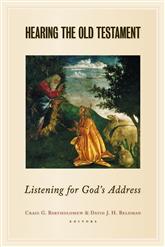 Hearing the Old Testament: Listening for God’s Address edited by Craig Bartholomew and Davide J. H. Beldman (Eerdmans) $32.00 Well, I could say any number of things about this very handsome new paperback, but let is suffice to highlight two. Firstly (and this is huge), the book is dedicated to newly retired Redeemer College professor Al Wolters, whose book Creation Regained (Eerdmans; $14.00) I mention often, most recently, in passing in my long “Booksellers Appreciation for N.T. Wright” piece last week. Al has been exceedingly influential, also on Brian Walsh, who had some influence about how Wright came to understand worldviews and the Scriptures (as Wright explains in the magisterial, meaty, and exceptionally significant first portion of The New Testament and the People of God (Fortress; $32.00.) Which is to say, this book of Al’s, a basic introduction to what some call a “reformational worldview”, has left marks which can be seen on Walsh and Wright.
Hearing the Old Testament: Listening for God’s Address edited by Craig Bartholomew and Davide J. H. Beldman (Eerdmans) $32.00 Well, I could say any number of things about this very handsome new paperback, but let is suffice to highlight two. Firstly (and this is huge), the book is dedicated to newly retired Redeemer College professor Al Wolters, whose book Creation Regained (Eerdmans; $14.00) I mention often, most recently, in passing in my long “Booksellers Appreciation for N.T. Wright” piece last week. Al has been exceedingly influential, also on Brian Walsh, who had some influence about how Wright came to understand worldviews and the Scriptures (as Wright explains in the magisterial, meaty, and exceptionally significant first portion of The New Testament and the People of God (Fortress; $32.00.) Which is to say, this book of Al’s, a basic introduction to what some call a “reformational worldview”, has left marks which can be seen on Walsh and Wright.
Further, Al shifted his research and teaching in the 1980s from philosophy to Old Testament studies, where he produced monographs and essays, edited books and hosted conferences, wrote on the Dead Sea Scrolls and explored how bad (dualistic) assumptions shaped the ways in which the Bible has been used or misused. (He has one collection of essays just on Proverbs 31 where he does some remarkably exegetical sleucing.) His knowledge of how trends of interpretation have held sway in different times and places is incredibly interesting and illuminating. When Wright, in his new book on the Kingdom of God (How God Became King; HarperOne; $25.99), explores how we’ve missed the central “this worldly” aspect of God’s glorious reign, I think, “yes, Al Wolters has been exploring this for decades, showing where we’ve gotten things wrong, and why.”
Alas, here is a new book in his honor, a collection of excellent Old Testament scholars who truly want their academic work to serve the people of God. Critical studies of the texts shouldn’t obscure matters, but should make God’s Word more available. These 17 pieces by the likes of M. Danny Carroll, R., Tremper Longman, Ian Provan, Aubrey Spears, Gordon Wenham, Christopher Wright and Al Wolters and others show that great work like this can indeed serve God’s people, helping interested readers truly absorb and live out the implications of these texts written so long ago. I’m all about reading and re-reading N.T. Wright on New Testament stuff—I think the Simply Jesus is spectacular and I’m part-way through the new one—but he will be the first to say that to understand the gospels, one has to know the story they are telling. Which has not a small bit to do with the story of Israel, as narrated in the Older Testament. One can’t understand the claims Jesus made about Himself or the work he was doing—dying and rising so that the Kingdom could be inaugurated—without knowing the Hebrew Scriptures, or First Testament as some call it. This book, and others like it, are important for our New Testament understandings! See the table of contents and authors, here.
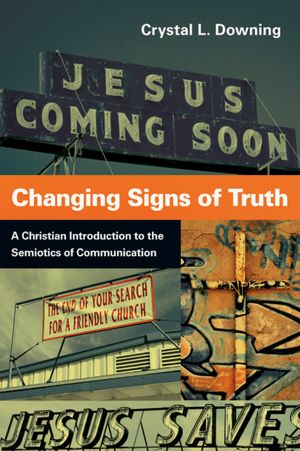 Changing Signs of Truth: A Christian Introduction to the Semiotics of Communication Crystal L. Downing (IVP) $24.00 Perhaps it is a stretch, but as I pondered N.T. Wright’s visit, his impromptu speech in our backyard, his jokes about Italian taxi-drivers and his spot-on recollection of what Dylan said on a bootleg album before a certain song, as I realized his extraordinary knowledge of first century Greco-Roman culture and ancient Jewish history, and yet his ability to relate to this York County lawn-chaired audience, I had to marvel at the kind of communication skills the man has. And his skills in knowing ways to connect symbols and signs, ideas and shared memories, common experiences, and even how he could subvert or play with these common-place sayings or cultural icons, weaving together a learned talk in very creative ways. That, in a way, is what Ms Downing’s new book is about, a study of the heavy-duty postmodern theorists of communication theory that offer ways Christians, too, can be savvy about “reading the signs of the times” and making sense of our odd mash-up of images, symbols, and signs. Downing wrote a previous book called How Postmodernism Served My Faith which I highly recommend as a primer on how evangelicals can—should?—appropriate postmodern theories of deconstruction. This may be the next step into the vortex: she looks at linguists and semiotians Roman Jakobson, Charles Sanders Pierce, Antonio Gramsci, Mikhail Bakhtin and others. Rave reviews on the back are from solid evangelical thinkers such as Quentin Schultze, Mark Noll, Terry Lindvall.
Changing Signs of Truth: A Christian Introduction to the Semiotics of Communication Crystal L. Downing (IVP) $24.00 Perhaps it is a stretch, but as I pondered N.T. Wright’s visit, his impromptu speech in our backyard, his jokes about Italian taxi-drivers and his spot-on recollection of what Dylan said on a bootleg album before a certain song, as I realized his extraordinary knowledge of first century Greco-Roman culture and ancient Jewish history, and yet his ability to relate to this York County lawn-chaired audience, I had to marvel at the kind of communication skills the man has. And his skills in knowing ways to connect symbols and signs, ideas and shared memories, common experiences, and even how he could subvert or play with these common-place sayings or cultural icons, weaving together a learned talk in very creative ways. That, in a way, is what Ms Downing’s new book is about, a study of the heavy-duty postmodern theorists of communication theory that offer ways Christians, too, can be savvy about “reading the signs of the times” and making sense of our odd mash-up of images, symbols, and signs. Downing wrote a previous book called How Postmodernism Served My Faith which I highly recommend as a primer on how evangelicals can—should?—appropriate postmodern theories of deconstruction. This may be the next step into the vortex: she looks at linguists and semiotians Roman Jakobson, Charles Sanders Pierce, Antonio Gramsci, Mikhail Bakhtin and others. Rave reviews on the back are from solid evangelical thinkers such as Quentin Schultze, Mark Noll, Terry Lindvall.
Interestingly, the postmodern interest in semiotics isn’t all that new. Dr. Downing shows that John Wycliffe and William Tyndale, Samuel Taylor Coleridge and C.S. Lewis all paid attention to signs and symbols. We should too, especially if we have great passion to be effective in our witness to Jesus’ Kingdom in the changing landscapes of our contemporary cultures. This isn’t exactly a book on being a better communicator, but it seems to be more than just an esoteric example of contemporary Christian scholarship. One thing is for sure—like Wright masterfully speaking outdoors at Hearts & Minds the other day—reading this will be a delight, as you come to know more about a topic you may not have studied, getting to know, too, a top-notch scholar, a person of humor and wit, passion and insight. Downing is a prof at Messiah College, and does excellently-written film reviews for Books & Culture. And she drops by our shop from time to time. Learn more about her book here. Come back here to buy it, please.
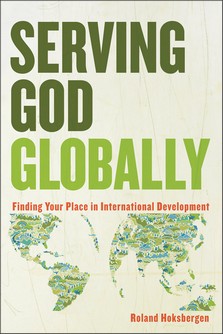 Serving God Globally: Finding Your Place in International Development Roland Hoksbergen (BakerAcademic) $21.99 I was tickled when N.T. Wright started preaching a bit–with some up to date data and some illustrations—about the campaign to cancel third world debt. He suggested that all sorts of churches in England held the public policy people’s feet to the fire and got the British government to pressure international banks and such (it is complicated!) to relieve some debt. Oh if there was such cooperation between evangelical, mainline, catholic and liturgical churches here. Anyway, Tom has long been outspoken about the debt crisis and has been active in the Jubilee Campaign to cancel unsustainable debt. That is a long way of noting that it makes perfect sense, with Tom’s talk ringing in our ears, to highly recommend what looks like one of the best resources about learning about international development, global justice, and what needs doing in all manner of development work. This new book emerged out of a great series of conferences on global justice and international development held at Calvin College in Grand Rapids, (you thought they were just famous for their renowned bi-annual writing festival, or their very cool faith & music festival, or the respected Worship Institute events.) Co-sponsored by their denomination’s excellent World Relief Committee, the event draws on international leaders from all over the glob. Kudos to Dr. Hoksbergen (who teaches economics as well as international development at Calvin College) and to those who helped assembly this great handbook.
Serving God Globally: Finding Your Place in International Development Roland Hoksbergen (BakerAcademic) $21.99 I was tickled when N.T. Wright started preaching a bit–with some up to date data and some illustrations—about the campaign to cancel third world debt. He suggested that all sorts of churches in England held the public policy people’s feet to the fire and got the British government to pressure international banks and such (it is complicated!) to relieve some debt. Oh if there was such cooperation between evangelical, mainline, catholic and liturgical churches here. Anyway, Tom has long been outspoken about the debt crisis and has been active in the Jubilee Campaign to cancel unsustainable debt. That is a long way of noting that it makes perfect sense, with Tom’s talk ringing in our ears, to highly recommend what looks like one of the best resources about learning about international development, global justice, and what needs doing in all manner of development work. This new book emerged out of a great series of conferences on global justice and international development held at Calvin College in Grand Rapids, (you thought they were just famous for their renowned bi-annual writing festival, or their very cool faith & music festival, or the respected Worship Institute events.) Co-sponsored by their denomination’s excellent World Relief Committee, the event draws on international leaders from all over the glob. Kudos to Dr. Hoksbergen (who teaches economics as well as international development at Calvin College) and to those who helped assembly this great handbook.
Ron Sider says of it, “A wonderful combination of excellent scholarship, gripping stories, and practical wisdom. A wise, indispensable guide…” As Andrew Ryskamp (of the Christian Reformed World Relief Committee) puts it, “Hoksbergen weaves time-tested principles of community transformation into a practical guide for use by the church especially young adults. He makes it clear that ministry among the poor is a much for the transformation of those seeking to help as it is for those seen as recipients It is, after all, only when poverty is understood relationally that we can work together to change the systems and affect true transformation. A must-read book for every church and individual involved in community ministry, at home or abroad.” Right on. I will revisit this soon, but for now, I can tell, that this is one of the best books of its kind I have ever seen. There may not be anything like it—we’ve had a section about global concerns and development issues in our shop for 30 years. This may be one of the best we’ve yet seen.
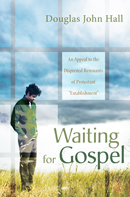 Waiting for the Gospel: An Appeal to the Dispirited Remnants of Protestant “Establishment” Douglas John Hall (Wipf & Stock) $25.00 This book arrived today, and oh how I wish I could sit at lunch, again, with Bishop Wright, and continue the conversation we started about Douglas John Hall, who he knows. Hall is a thoughtful United Church of Canada theologian, now in Quebec, and he offers here a collection of essays, talks, articles and papers he has gathered together to point us towards his project of lived theology. He is an old school 20th century liberal Protestant, having studied with Tillich and Barth. He has written widely about suffering and the cross, and the methods of doing theology in a North American contextualized way and is known also for his work on our task to be stewards of the creation. Last summer I read (and reviewed) a short memoir he wrote, telling about an eccentric and brilliant bookseller who was influential over a generation of Canadian mainline Christian leaders and scholars, and I came to appreciate Hall that much more. This collection looks fascinating, albeit if it does presume a more liberal Protestant reader. At his heart, Hall is a witness to the cross, a profoundly evangelically-minded scholar, very educated, and although getting along in years, still contributing papers, sermons, and clever jeremiads like his last chapter, “A Latter -Day Kierkegaardian Attends a Megachurch.”
Waiting for the Gospel: An Appeal to the Dispirited Remnants of Protestant “Establishment” Douglas John Hall (Wipf & Stock) $25.00 This book arrived today, and oh how I wish I could sit at lunch, again, with Bishop Wright, and continue the conversation we started about Douglas John Hall, who he knows. Hall is a thoughtful United Church of Canada theologian, now in Quebec, and he offers here a collection of essays, talks, articles and papers he has gathered together to point us towards his project of lived theology. He is an old school 20th century liberal Protestant, having studied with Tillich and Barth. He has written widely about suffering and the cross, and the methods of doing theology in a North American contextualized way and is known also for his work on our task to be stewards of the creation. Last summer I read (and reviewed) a short memoir he wrote, telling about an eccentric and brilliant bookseller who was influential over a generation of Canadian mainline Christian leaders and scholars, and I came to appreciate Hall that much more. This collection looks fascinating, albeit if it does presume a more liberal Protestant reader. At his heart, Hall is a witness to the cross, a profoundly evangelically-minded scholar, very educated, and although getting along in years, still contributing papers, sermons, and clever jeremiads like his last chapter, “A Latter -Day Kierkegaardian Attends a Megachurch.”
DISCOUNT
any book mentioned
2O% off
order here
takes you to the secure Hearts & Minds order form page
just tell us what you want
inquire here
if you have questions or need more information
just ask us what you want to know

